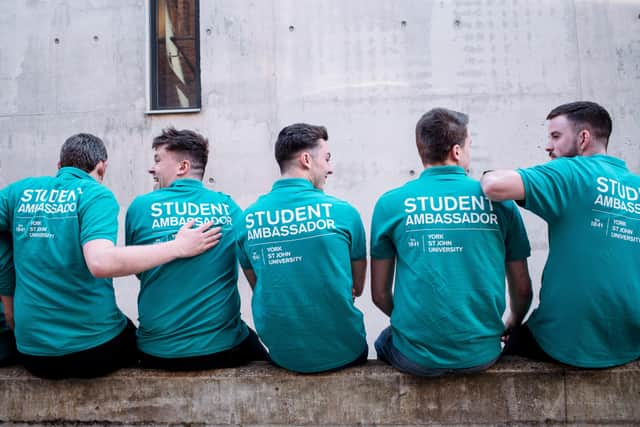Why Generation C and its talent must be valued – Justine Greening


No-one knows how the coming weeks will unfold or how long the lockdown will last. But it doesn’t mean that we can’t have ambitions for our country and think ahead to life after we have shaken off this terrible virus and restarted our economy.
Because it will take a national effort to overcome coronavirus, but also a national effort to help Britain rebound.
Advertisement
Hide AdAdvertisement
Hide Ad

Yet, the biggest risk that we face for the long term is that today’s generation of young people have their prospects and careers stunted by a health emergency that was utterly beyond their control. It’s the Covid Generation – ‘Generation C’.
Britain has long had an opportunity gap which means where you start in life has too much influence over the opportunities you get and where you end up. It overwhelmingly impacts people from more disadvantaged communities and backgrounds and the gaps start opening up from the moment we’re born.
It’s why I left Parliament to work on social mobility with companies and universities across the country, including many in the Yorkshire region. We used to ask ‘can we make things better’? Now there’s no question – we must make things better.
Day by day, it becomes clearer that without concrete action to help young people at every stage of their formative years, Britain risks a lost generation of talent.
Advertisement
Hide AdAdvertisement
Hide Ad

For those in the education system, its impact is obvious. Education closes the gaps between the life chances of different children and young people. But our education system is shut down virtually across the board, from early years, to schools, colleges and university.
Children are out of school and missing teaching. Some parents will be less able than others to help them continue studying. We already know that over the existing six weeks school summer holidays, some children drop back in learning. Yet the coronavirus break could see children out of schools for months with a much bigger impact.
For young people who were due to take A-Levels this year, using predicted grades may well be the only viable approach.
However, research by the Sutton Trust shows us that underpredicting of grades of disadvantaged young people is significantly more likely than for their better off counterparts. This disproportionately reduces their chances of getting into the university they were aiming for.
Advertisement
Hide AdAdvertisement
Hide AdMeanwhile, an estimated one in three young people in work who are under the age of 25 have roles in the retail, hospitality and sports and leisure sectors that are worst affected by coronavirus. A significant number will have needed this part-time work to help pay university costs, so the loss of income risks making continued study impossible for those who aren’t lucky enough to have wider family resources to help.
And even when Britain is back open for business, this year’s graduates, with higher student debt than any generation before, will be hit by a sharp reduction in the numbers of entry level jobs into careers.
With fewer graduate roles and fewer apprenticeships, the danger is that connections trump talent in the battle for a more limited set of opportunities.
Research already shows that almost two out of three graduates surveyed said they have had job applications either paused or withdrawn by employers because of the coronavirus pandemic.
Advertisement
Hide AdAdvertisement
Hide AdThat’s why I’ll be working with the Social Mobility Pledge employers to see how we can collectively respond and continue to give opportunity to as many young people as possible. The reality is that businesses will play a crucial role not only during the crisis but afterwards, and I’d like to see Government work with us to ensure that we minimise the widening Covid opportunity gap.
Ours is a country where advantage accumulates but so does disadvantage. The underlying challenge in inequality of opportunity and Britain’s opportunity gap was already there before, but coronavirus widens the chasm much further, catching even more young people. Today’s young people are the ones we will rely on to rebuild Britain’s economy for the long term and they must be able to contribute their talents.
Let’s not wait until the autumn to confront the opportunity gap crisis that follows the coronavirus pandemic. Coronavirus overtook the world with little warning, and we continue to struggle to deal with its impact.
But in winning the war, Britain must also plan for winning the peace. For the futures of millions of young people, and above all, for those already the furthest away from a level playing field on opportunity, let’s think ahead to the solutions for them.
Advertisement
Hide AdAdvertisement
Hide AdWill Generation C come to define those years when young people fell through an opportunity gap widened by coronavirus? Or will it be the first generation to truly have equality of opportunity.
They deserve a promise from us all that it will be the latter. There must be no lost generation on opportunity because of coronavirus.
Editor’s note: first and foremost - and rarely have I written down these words with more sincerity - I hope this finds you well.
Almost certainly you are here because you value the quality and the integrity of the journalism produced by The Yorkshire Post’s journalists - almost all of which live alongside you in Yorkshire, spending the wages they earn with Yorkshire businesses - who last year took this title to the industry watchdog’s Most Trusted Newspaper in Britain accolade.
Advertisement
Hide AdAdvertisement
Hide AdAnd that is why I must make an urgent request of you: as advertising revenue declines, your support becomes evermore crucial to the maintenance of the journalistic standards expected of The Yorkshire Post. If you can, safely, please buy a paper or take up a subscription. We want to continue to make you proud of Yorkshire’s National Newspaper but we are going to need your help.
Postal subscription copies can be ordered by calling 0330 4030066 or by emailing [email protected]. Vouchers, to be exchanged at retail sales outlets - our newsagents need you, too - can be subscribed to by contacting subscriptions on 0330 1235950 or by visiting www.localsubsplus.co.uk where you should select The Yorkshire Post from the list of titles available.
If you want to help right now, download our tablet app from the App / Play Stores. Every contribution you make helps to provide this county with the best regional journalism in the country.
Sincerely. Thank you.
James Mitchinson
Editor
